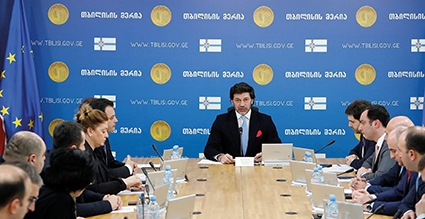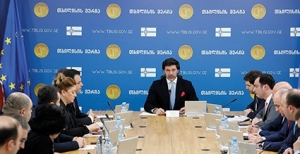Kaladze’s Weekly Priorities: Public Transport, Support for Children with Autism
Each week, the municipal government of Tbilisi holds a meeting at City Hall. Preceding this week’s meetings, Mayor Kakha Kaladze remarked on several topics of interest.
Kaladze opened the meeting by discussing public infrastructure. Two new subway cars were added to the Tbilisi Metro, one on each line, with plans to add two more in the near future. City Hall plans to renovate all the old cars that are still operational. Metro ridership has increased by 25% year-on-year. Kaladze attributed this uptick to the improved quality of cars and shorter wait times between trains. Previous wait time was an average of four minutes. It has now been reduced to three minutes, and the goal is to shorten it to just two and a half minutes during peak hours.
Kaladze also announced the opening of the call for bids on the construction of the new metro lines between Samgori and Lilo and between Samgori and Tbilisi International Airport. Plans were expressed to commission a survey to explore the potential of connecting Tbilisi to Rustavi via a metro line.
Another topic of discussion was the winner of the tender to manage advertising on taxis and public transportation – private marketing firm Alma. For the first two years, Alma will not pay drivers directly for carrying advertisements, but instead issue them vouchers to repaint their cars the newly-required white, and for car washes.
The city also plans to rehabilitate the Youth Palace on Rustaveli Avenue, a 200-year-old cultural heritage monument that is one of the landmarks of Tbilisi. The building’s function has changed many times in the past century. The first national flag of the Democratic Republic of Georgia was raised there. Today, it holds the American Embassy’s American Corner location for Tbilisi. The palace’s façade and interior are in need of a complete renovation. The work will cost approximately 599,000 GEL ($225,000).
“The palace building will be completely restored and future generations will be able to use the space for many decades,” promised Kaladze.
The Mayor also discussed a new initiative to expand programs for children on the autism spectrum. Current programs reach just 850 children, but the plan is to reach 1,000 children with renewed funding support.
“The capital city has been working in this direction for years,” said Kaladze, “There are seven institutions that serve these children. When I was in the City Assembly, a member of an opposition party asked if it was possible to increase the number of children that the City Hall will serve and finance. As far as I know, there were more than 130 waiting at that time. We – my staff, my deputy, Sopio Khuntsaria, was personally involved in the process. We met with representatives of this opposition party and decided to increase the number of beneficiaries up to 1000, i.e., to satisfy the children who were in the waiting line. For this, we spent 3.7 million GEL ($1.4 mln). With this decision, about 445,000 GEL ($167,000) will be allocated to support these families and children as much as possible.”
The Mayor then touched on the environment. “We are doing a lot of work to improve the ecological situation in the capital; we are carrying out various projects. I would like to inform residents about infected pine trees. Last year, we brought in international experts who conducted research and studied the current situation. The results showed that we have a very difficult situation in the city and if we do not take concrete steps today, we may face an ecological catastrophe. Accordingly, the EcoService Group has already made sanitary cuts. In total, thousands of diseased pine trees will be cut down and replaced with new trees,” said Kaladze. The majority of the trees infected with the contagious disease, he said, are on private land.
Finally, Kaladze discussed the importance of tourism development for Tbilisi. “I had a talk with the Prime Minister about how we should position Tbilisi on various platforms to explain to tourists how attractive and interesting our city is.” He called on Andria Basilaia, the head of the City Hall Economic Development Department, to “Show the world how beautiful our city is and how rich its culture is for which each of us is proud. We have a lot of sights and hospitality, which it is very important to popularize. We have to maximize our city to be the best capital, to draw as many tourists as possible to spend more time here. With the money from tourism, we will be able to finance other important directions.”
By Samantha Guthrie
Image source: Tbilisi City Hall












